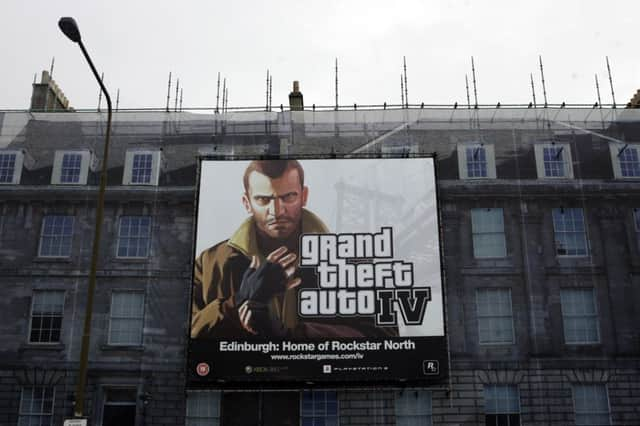Martyn McLaughlin: lawsuit lays bare Rockstar North power struggle


Driving to the destination, he strikes up conversation with his accomplice. “If the deal makes paper,” the acquaintance informs him, “I do it.” Niko pauses, before replying: “I like to make money, but there should be other considerations when you go into business with a person. I have learned that at a price.”
The scenario is typical of a best-selling video game series which puts the player at the heart of a teeming hyperreality of America’s underbelly. The franchise, produced here in Scotland, is at once a love letter to the States and a scabrous burlesque mocking its customs and culture, whose characters invariably become caught up in Faustian plots of riches, power and treachery.
Advertisement
Hide AdAdvertisement
Hide AdThe set pieces are overblown and the humour seldom subtle - evidence, its creators say, of a satirical entertainment product that strikes a chord with players as far afield as Tulsa, Oklahoma and Tullynessle, Aberdeenshire. Occasionally, however, its parody glosses over a few home truths.


A lawsuit filed last week with the New York County Clerk lays bare the extraordinary struggle for money and control at Rockstar North, the Edinburgh-based company behind the series, and suggests those at the helm of the firm should have paid heed to Niko’s dictum.
After nearly three decades of carefully choreographed public relations and an iron curtain of secrecy, the decision by the company’s former president, Leslie Benzies, to sue for royalties he alleges are due him, lifts the lid on the company’s success. The staggering figures contained in the 71-page lawsuit ought to put paid to any lingering prejudices that relegate the games industry to the cultural and economic periphery.
According to Benzies and his legal team, Sam and Dan Houser, the co-founders of Rockstar North’s parent company, Rockstar Games, allocated themselves £65m in profit-sharing payments since September 2014, with a further £367m in profits “unaccounted for”. Consider for a moment the sums involved here, comparable to the £367m bonus pool paid out by RBS in 2015. Even the bankers must be wondering if they are in the wrong game.
The numbers are even more astonishing when considering the sales of the most recent instalment in the series, Grand Theft Auto V. According to the lawsuit, revenues generated by the title are now in the region of £2.1bn. It doesn’t stop there. GTA Online, a component of the game which allows players to roam an alternate version of Southern California, has generated at least £348m in revenues from people purchasing virtual currency to be used in game on the likes of cars, properties and weapons. “These purchases have a nearly 100 per cent profit margin, subject only to nominal development costs and app store commissions,” the lawsuit notes.


Ordinarily, such margins only exist in unsolicited spam emails from Abuja scam artists, yet thanks to a combination of game design and business acumen, Rockstar North has hit upon a way of printing money.
It should be no surprise, then, that Mr Benzies, from Elgin, intends to take the firm, its parent company, Take Two Interactive and the Housers to court. He alleges the siblings reneged on the terms of an incentive compensation programme based on profit sharing and is suing for £105m. Rockstar and Take Two have in turn filed a counter suit, with the former company dismissing the allegations as “entirely without merit and in many instances downright bizarre”.
With so much money and commercially sensitive information at stake, the chances are the case will be settled before it comes to court. But the damage is already done. As well as disclosing the eyewatering financial rewards at executive level and potentially derailing the development of the next GTA game, the lawsuit claims Sam Houser “orchestrated and encouraged a company culture involving strip clubs, personal photography of employees in sexually compromising positions, and other conduct grossly in violation of standard workplace norms.”
Advertisement
Hide AdAdvertisement
Hide AdIn the bold and brash world of tech companies, unorthodox practices are to be expected, but these claims allege something altogether darker. Neither are they particularly new. The author, David Kushner, who wrote a book about Rockstar, has alleged that a former assistant to Dan Houser was derided as a “useless whore” and a “****” after failing to provide him with a bagel. He also relayed accounts of parties where employees are encouraged to take part in eating contests where they consume fist-sized balls of deep fried cheese, washed down with tequila.
Such episodes have cemented the reputation of Rockstar’s prime movers and shakers as anti-establishment rebels unwilling to play by the rules. The image was never wholly convincing; Sam Houser, after all, was a classmate of George Osborne, while his brother is an Oxford graduate.
The allegations in the lawsuit suggests the renegades have fallen into a quintessentially corporate trap: an internecine legal battle over money. When it first announced its latest GTA title, Rockstar gave a concise summary of its story. The game, it said, “focuses on the pursuit of the almighty dollar”. To quote Niko Bellic as the credits roll on GTA 4: “So this is what the dream feels like, this is the victory we longed for.”